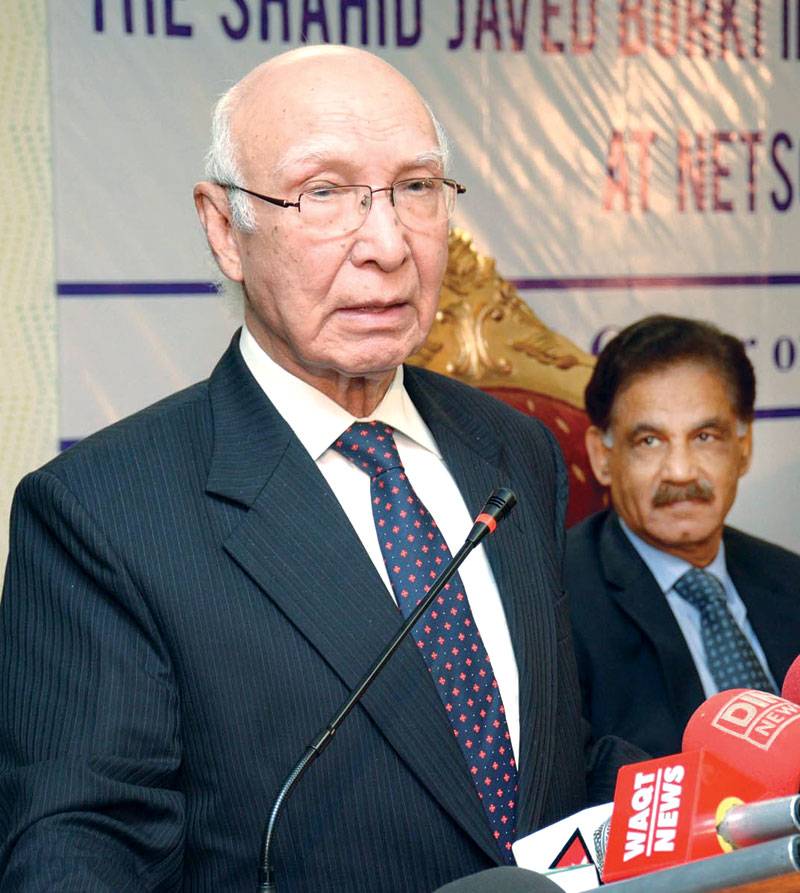LAHORE - Prime Minister’s Adviser on National Security and Foreign Affairs Sartaj Aziz said on Sunday that Pakistan had never been a part of an arms race with India and would keep this policy in future as well.
“However, keeping in view the regional situation, Pakistan would continue to maintain a balance in conventional weaponry,” he said while talking to mediamen after the launch of Shahid Javed Burki Institute of Public Policy (SJBIPP) here at Netsol building.
He said that despite financial constraints, the government had been catering to the needs of its armed forces and would continue with this spirit in future also.
To a question, Sartaj Aziz said it was India that had suspended the process of composite dialogue with Pakistan and now it wanted to initiate the talks again. The Indian prime minister telephoned his Pakistani counterpart in this regard, he added. He said the foreign secretaries of both the countries would be meeting soon to restore the dialogue process from the point it was suspended.
Answering a query, he said Kashmir issue would be on the agenda of upcoming talks between the two countries. “Of course, Pakistan and India will discuss at length all the mutual issues including Kashmir,” he said, adding that negotiations would help reduce the current tension on the Working Boundary and the Line of Control.
The PM’s adviser further stated that Pakistan’s stance on the core issue of Kashmir was very much clear and it was a considered opinion here that a logical conclusion of Pak-India dialogue was impossible sans Kashmir.
Stressing that security was an important component of country’s foreign policy, Sartaj said the government would not compromise on security and national interest. “But the security and economy were inter-linked,” he remarked. He hoped that if the two-way dialogue moved forward successfully, a meeting between the prime ministers of the two countries may take place any time.
In the backdrop of APS Peshawar incident, he said that relations between Pakistan and Afghanistan had improved a lot in the recent past as both the countries were now working on intelligence sharing instead of indulging in the blame game. He said the two governments had also expressed their firm resolve not to let their respective territory be used for terrorism against each other.
Responding to another query, Sartaj Aziz said that effective reforms were being introduced in religious seminaries, other educational institutions and Fata to end extremism. He believed that initiatives taken under the National Action Plan were now bearing fruits to resolve the grave problems of terrorism, extremism, sectarianism and other related issues. He said there were no good or bad Taliban and the operation was being carried out without any discrimination.
Earlier, addressing the SJBIPP launching ceremony, Sartaj observed the new institute would play an important role in the policy-making process. Appreciating Netsol’s efforts for economic uplift in Pakistan, he said science and technology had a major role in sustainable economic growth. Sartaj said unemployment was a big challenge confronting Pakistan and the government was making hectic efforts at all levels to address this problem.
Former foreign minister Khursheed Mehmood Kasuri, Netsol VC Shahid Najam and SJBIPP’s head Shahid Javed Burki were also present on the occasion.
DELHI DOESN’T WANT DURABLE
PEACE, says ASIF
Defence Minister Khwaja Asif said the increase in Indian defence budget and mindset of pursuing arms race was the ample proof that New Delhi does not want durable peace in the Sub-Continent. He, however, made it clear that the whole Pakistani nation and its armed forces had full capability to counter Indian aggression at every level.
Talking to media men in Sialkot Sunday, the minister stressed the need of meaningful, fruitful and sincere talks between the two neighbouring nuclear states, and said the mounting tension along the Working Boundary and Line of Control would disrupt the peace-seeking efforts. He said the ceasefire violations by the Indians during the last six months reveal Delhi’s intentions, showing that India does not want durable peace.
Asif urged India to stop violating the ceasefire accord. “Decrease in border tension was must to hold meaningful and fruitful talks between Islamabad and Delhi,” he added. He said India should come forward for defusing border tension, as Islamabad was already doing a lot in this regard.
Friday, April 19, 2024
Pak-India talks to help reduce LoC tension: Aziz

Empowering Women: The Vision of Maryam Nawaz Sharif
8:37 PM | April 19, 2024
President Zardari confers Nishan-i-Imtiaz (M) award on Turkish CGS
8:23 PM | April 19, 2024
NA speaker suspends two MNAs for disruptive behavior during presidential address
8:20 PM | April 19, 2024
PM Shehbaz orders accelerating countrywide drive against smuggling
8:19 PM | April 19, 2024
LHC allows PTI to hold rally in NA-119
8:18 PM | April 19, 2024
A Tense Neighbourhood
April 19, 2024
Dubai Underwater
April 19, 2024
X Debate Continues
April 19, 2024
Hepatitis Challenge
April 18, 2024
IMF Predictions
April 18, 2024
Kite tragedy
April 19, 2024
Discipline dilemma
April 19, 2024
Urgent plea
April 19, 2024
Justice denied
April 18, 2024
AI dilemmas unveiled
April 18, 2024
ePaper - Nawaiwaqt
Advertisement
Nawaiwaqt Group | Copyright © 2024





